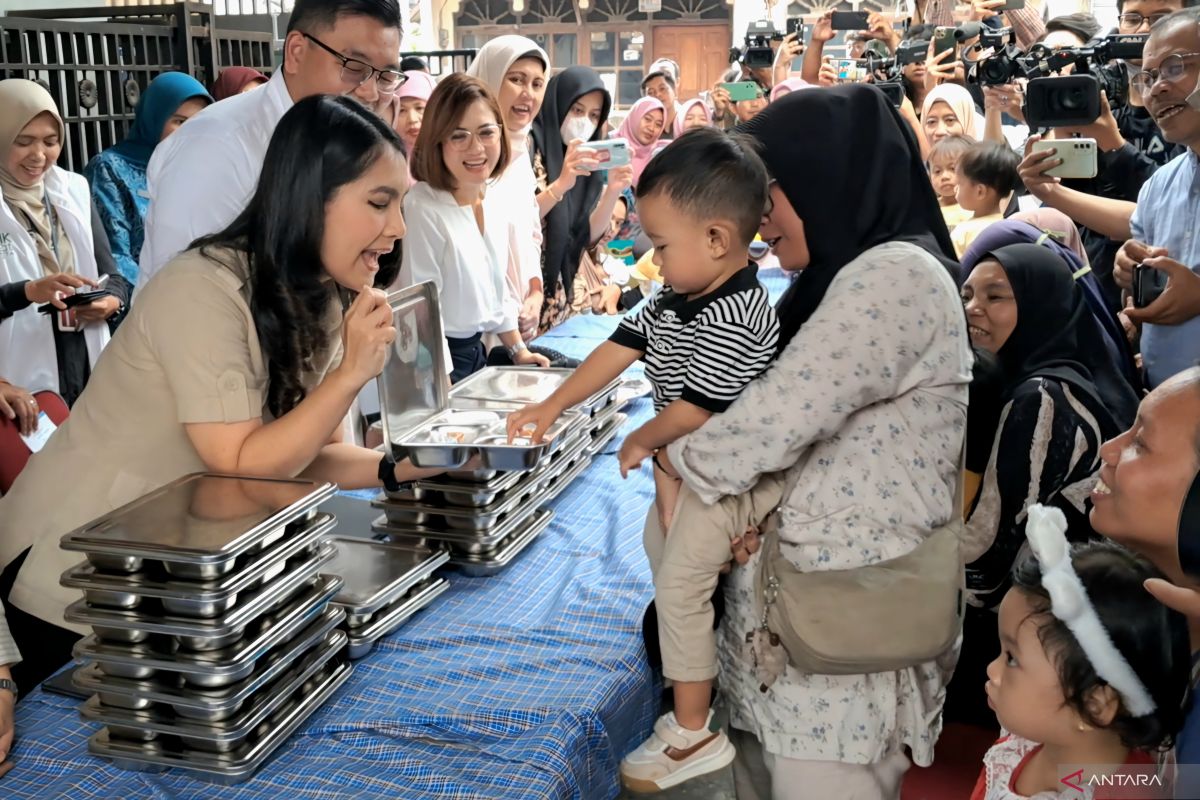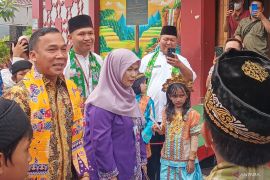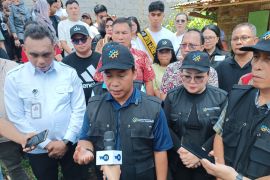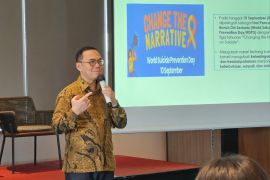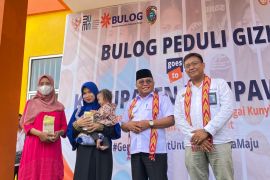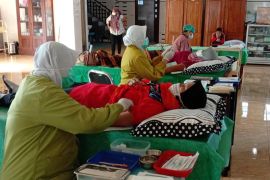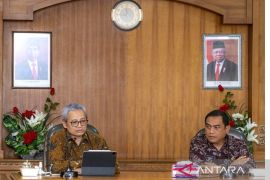Around 45 people comprising pregnant women, breastfeeding mothers, and under-five children received Free Nutritious Meals at the posyandu on that day.
In addition to Dahlia Posyandu, the meals were also distributed to target beneficiaries at the Anyelir Posyandu, Ciracas.
After a wait, Deputy Minister of Population and Family Development, Ratu Isyana Bagoes Oka, and Deputy Minister of Women's Empowerment and Child Protection, Veronica Tan, arrived to help distribute the meals on that day.
The menu consisted of spiced rice, eggs with butter sauce, stir-fried chayote and meatballs, oranges, and milk. Some children were seen eating the food enthusiastically, however, some mothers looked restless.
"The dish is lacking. I usually give my child fish at home," Windy, a 24-year-old mother, said at Dahlia Posyandu.
She was having a hard time trying to calm her child who was crying loudly due to the crowd at the integrated health post, which was packed with several cadres and officers distributing meals.
Several mothers moved the food to the lunch box that they had brought from home because their children did not finish the food. Indeed, while some looked enthusiastic, some children were being picky with the food.
"My children like meatballs so they ate all the meatballs, but not the eggs," Endang Monalisa, a 45-year-old mother from Susukan village, said at Anyelir Posyandu. She came to the posyandu with her 3.5-year-old twins, Nizam and Nadif.
At both Anyelir Posyandu and Dahlia Posyandu, no fathers could be seen accompanying the children, although this was understandable because it was a weekday—Friday.
"Where are the fathers? I do not see any men here. There are no fathers present today, are there?" Deputy Minister Tan asked.
"They are at work, madam," the mothers answered in unison.
She then advised them that on the next occasion, the fathers also accompany them so that they can see their child's development and play a role in parenting.
Importance of equal parenting
During every toddler check-up at posyandus, fathers are still rarely seen.
There are many reasons why the presence of fathers is still rare, for example, economic factors or the double burden on women.
Based on data from Statistics Indonesia (BPS), in 2020, there were 11.44 million women registered as heads of households, accounting for 15.7 percent of wage earners.
Acting deputy for gender equality at the Ministry of Women's Empowerment and Child Protection, Indra Gunawan, said that based on research conducted on 400 women informal workers in nine provinces, though the number of women workers is lower than men, the possibility of women becoming informal workers is greater, at around 66 percent or 54.5 million.
Based on the data, it can be concluded that women who bear a double burden in the family are more vulnerable to economic problems, which can lead to conflict in the household.
Deputy for coordination of children, women, and youth quality improvement at the Coordinating Ministry for Human Development and Culture, Woro Srihastuti Sulistyaningrum, said that equal parenting can reduce the double burden on women.
"We are currently encouraging equality in families, where, in parenting, men and women equally raise their children," she added.
Indeed, the role of fulfilling economic needs has so far been borne more by fathers.
However, the Ministry of Population and Family Development explained that fathers must also be involved—not only financially, they must also be emotionally present to fulfill the psychological needs of mothers and children.
Deputy Minister Oka said that to increase the involvement of fathers in parenting, her ministry is currently promoting the Exemplary Father Movement (Gate) as part of five acceleration programs.
So far, in feeding children, especially toddlers, mothers still play the main role.
Thus, through the Free Nutritious Meals program, it is expected that both fathers and mothers can get an education on good nutrition for the family.
Education on nutritional fulfillment will also involve cadres ranging from posyandu cadres to those from the family support teams (TPK) of the Ministry of Population and Family Development, whose number currently stands at 600 thousand nationwide.
"Children can also be introduced to various other menus; this is also very important. Their tongues will be accustomed to various menus, and hopefully, they will develop good eating habits," Oka added.
To realize equal parenting, Deputy Minister Tan emphasized the importance of family planning to produce quality children.
Posyandus, as places to monitor the growth of under-five children in Indonesia, must not only be filled with mothers, but also fathers because there, parents can learn about their children's growth achievements.
Going forward, posyandus will not only serve as places for monthly monitoring of children's growth but also for providing nutritional education for pregnant women, breastfeeding mothers, and children.
Thus, the presence of fathers is essential to creating an equal parenting ecosystem in the family.
Related news: Increase in free meals budget to support economy: official
Related news: Ready to partner with MSMEs, canteens for meals program: BGN
Translator: Lintang Budiyanti, Raka Adji
Editor: Azis Kurmala
Copyright © ANTARA 2025
